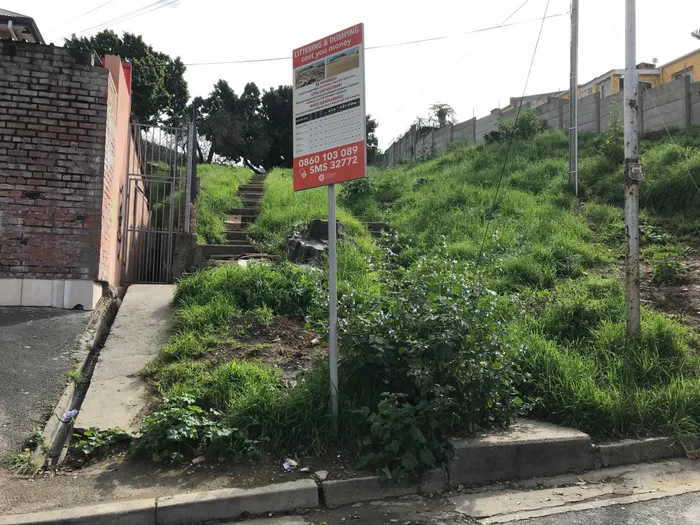Rats gnawing at Bo-Kaap residents’ nerves

People are still dumping illegally despite there being “no dumping” signs all over the Bo-Kaap.
Whether they’re home or not, residents of Bo-Kaap are keeping their doors and windows shut. And it’s not to keep out the biting cold. It’s to stop rats from getting into their homes.
Residents who have lived in the Bo-Kaap for more than 40 years believe this is the worst plague they have ever seen.
“It’s recent that we are having a real problem,” said Faried Matthews who lives opposite Biesmiellah restaurant.
“I mean there were always rats but now there are so much more. You even see them during the day and they enter my garage and they’re just eating stuff, biting through doors.
“I’m making metal plates for my neighbours that will prevent the rats from eating the bottom of the doors,” he said.
Shoukat Osman, the manager of Biesmiellah restaurant, said rats were nesting in the overgrown fields and open drains.
“These fields are not being cleaned and this is where the rats come from,” said Mr Osman.
“There are open drain pipes and I can’t close them. I see how rats run around here and there’s no doubt that Bo-Kaap is infested.”

Fadia Edwards claimed that once the lockdown was lifted, she noticed more rats in the area and informed the City of Cape Town of the problem.
“There was just an outbreak after lockdown was lifted. I logged a call with the council and they were here a few weeks ago to dispense the rat poison,” said Ms Edwards.
She believes that illegal dumping and littering are contributing to the rat infestation.
“There were rats in the courtyard and we had to keep our doors and windows closed because these rats will run in your house and you feel like a prisoner in your home. We’ve been here for 35 years and this is the worst I’ve experienced,” she said.
Galieja Martin, who has lived in the neighbourhood for nearly 70 years, said this was the worst infestation she had ever seen.
“They are so big. How do they get so big? They walk around here and they don’t run away when they see you. They are not afraid of us, we are afraid of them,” said Ms Edwards.
“They get in underneath the cars as well and I’m scared to get into the car because there could be a rat in the car. They’re eating away at the doors and there is a back door that has a big hole in it and so we’ve added metal plates to our doors now,” she said.
“I keep my kitchen door closed because I’m scared they will run in here. We are locked up in our house, I even close the windows.
“I’ve informed Erefaan about this and he takes it up with the council,” said Sulayla Isaacs, referring to Erefaan Ramjam who worked for the City for 37 years. He is a voluntary community worker for Bo-Kaap residents and logs calls to the City on their behalf.
“This has been a problem for years but I do think since lockdown was lifted that there are more rats. It’s not just a Bo-Kaap problem, it’s a city problem and there’s so many rats in the Gardens as well,” said Mr Ramjam.
“Garbage and dumping is a big problem in the area. If people litter then the rats come to where there is food, or where there is left over foods thrown out. Look the City does come when we log calls but they are not consistent. This is not a problem that will just disappear, they need to be consistent with what they do and the residents are being persistent because we want to get rid of the rats,” he said.
According to the City, between July 2021 and February 2022, they received 1 605 complaints concerning rats and completed over 41 000 services at baiting stations around the metropole.
However, said mayoral committee member for community services and health, councillor Patricia Van der Ross, they had no evidence of an increase in the rat population in Bo-Kaap.
“City Health has not received any indication that there is an increase in rodent activity in the area. If there was a significant increase in rodent activity in any particular area City Health would flag it as a hot spot and will ensure that an integrated pest management approach is conducted,” she said.
“This is to ensure that all possible environmental factors, for example dumping, water sources, harbourage areas, etc, contributing to the rodent activity are addressed concurrently with a block baiting programme to ensure that the infestation is brought under control.”
Ms Van der Ross added that their staff provided rodent control services as well as education and awareness about waste management, unlawful dumping, chemical safety, and how to protect dwellings against vermin.
According to Ward 77 councillor Francine Higham, unlawful dumping was a problem in the area that contributed to the migration of rats.
“I want to encourage residents to dispose of their waste in a responsible way. Please don’t throw food in the streets or the public areas as this is attracting the rats. If people want new bins or advice on how to get rid of waste they can contact me or the City. Waste management is a key part in keeping rats away,” she said.
